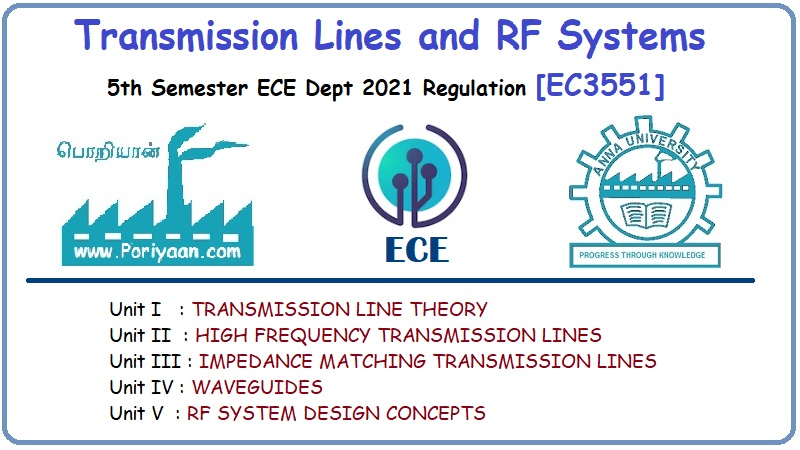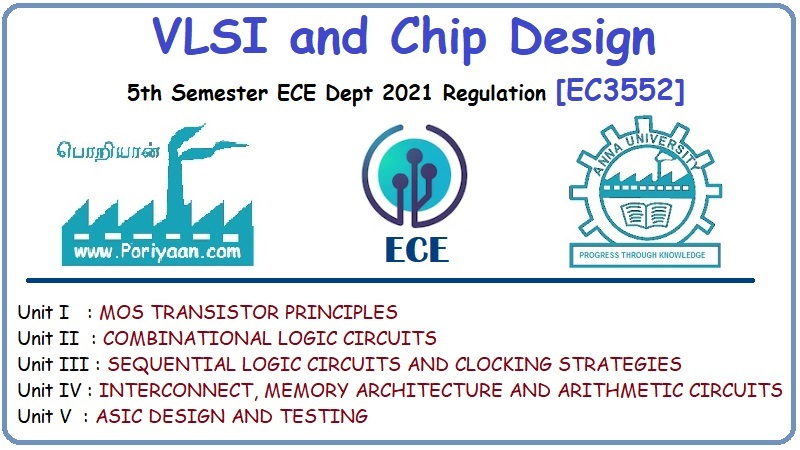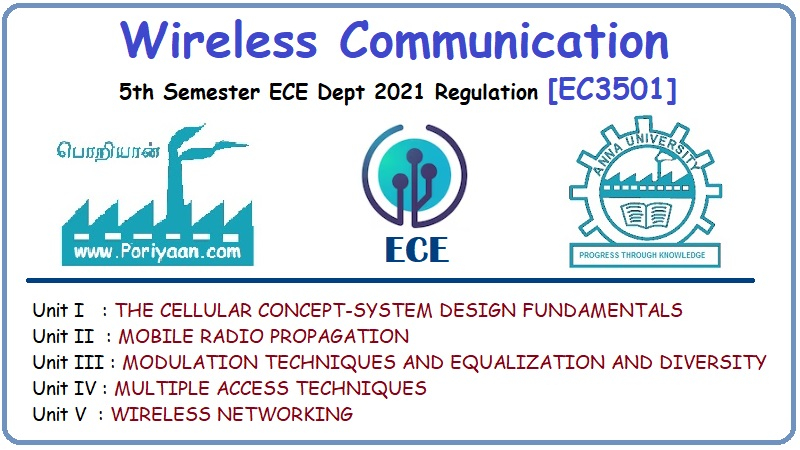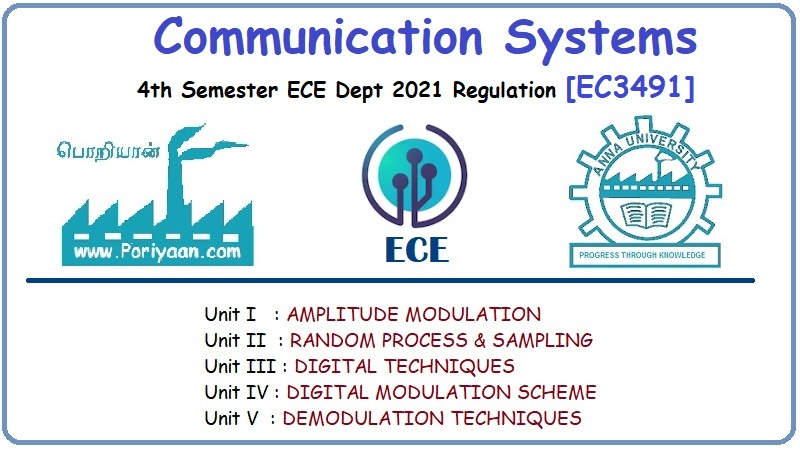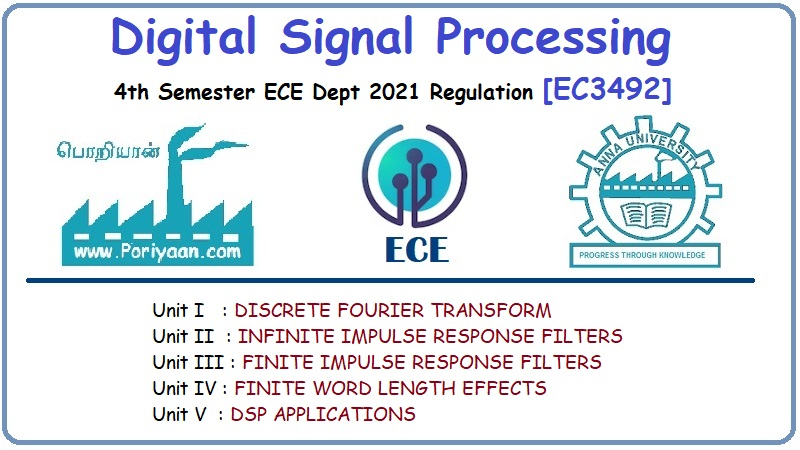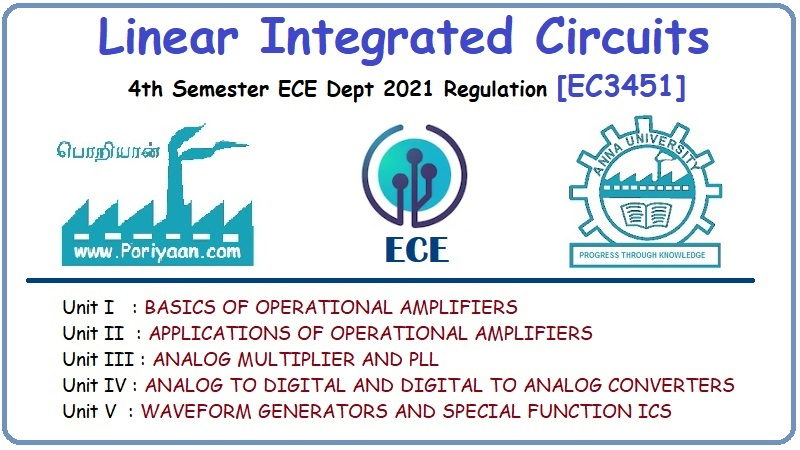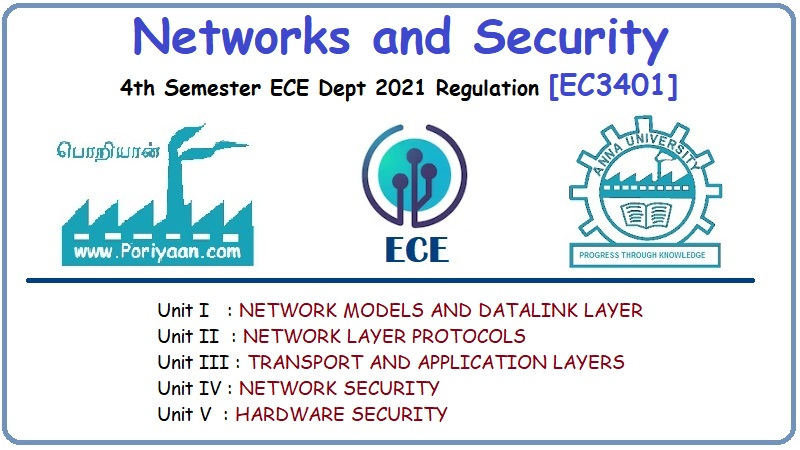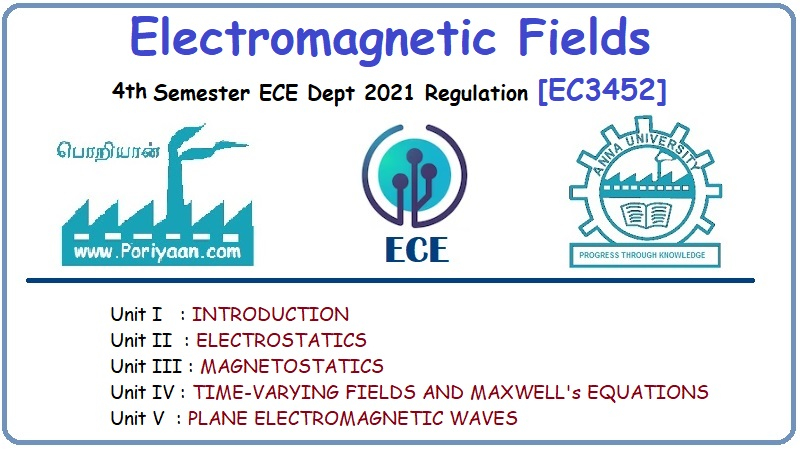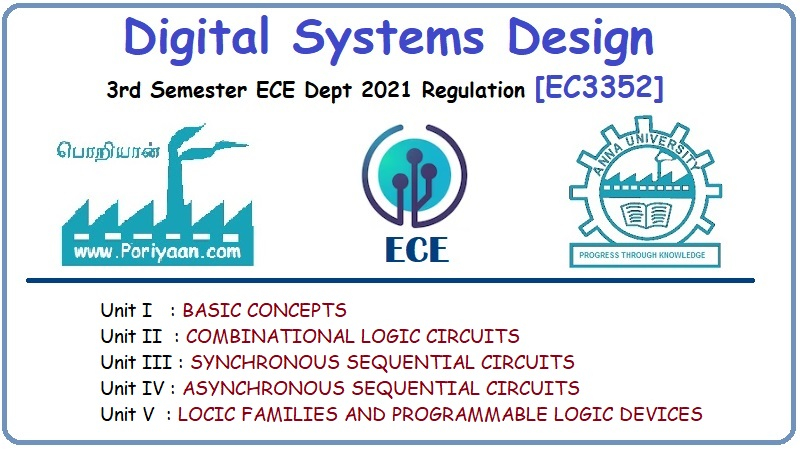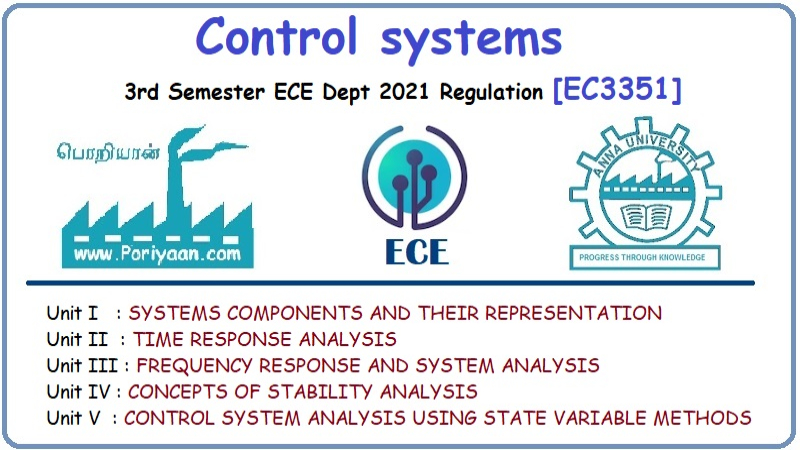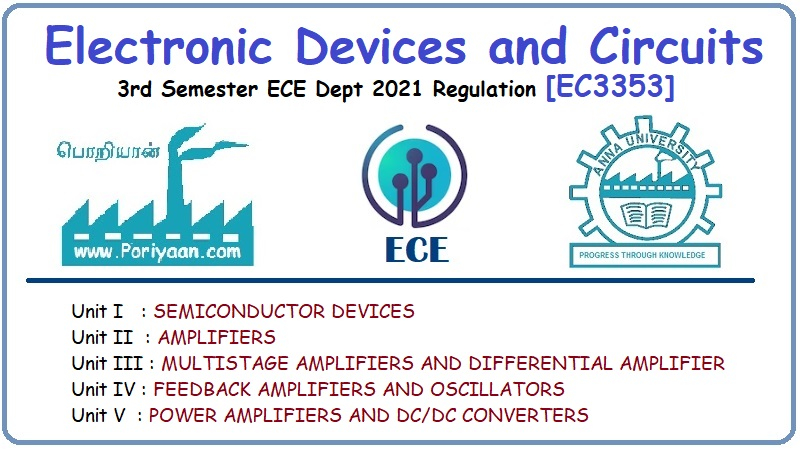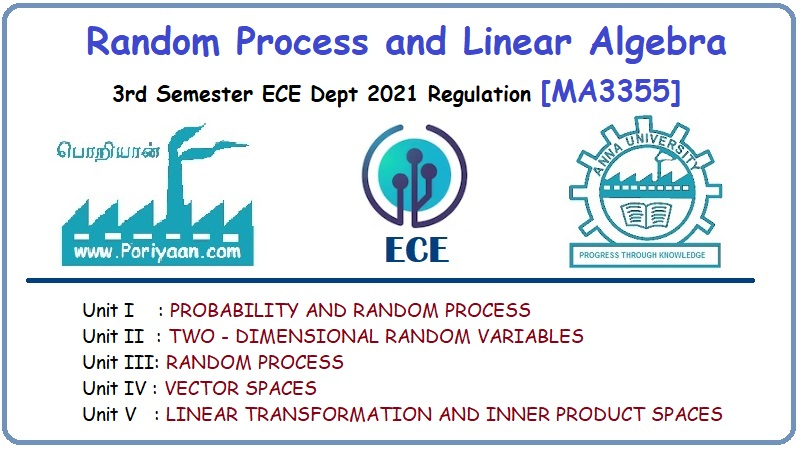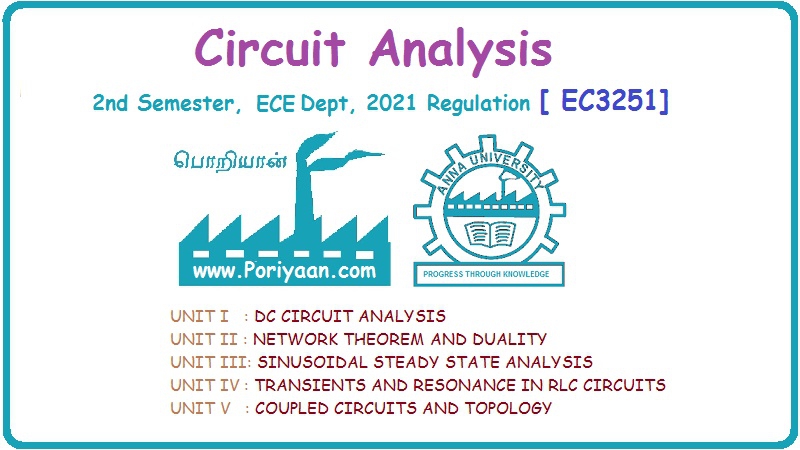Random Process and Linear Algebra
MA3355 - M3 - 3rd Semester - ECE Dept - 2021 Regulation

2021 regulation - 2nd year, 3rd semester paper for ECE Department (Electronics and Communication Engineering Department). Subject Code: MA3355, Subject Name: Random Process and Linear Algebra, Batch: 2021, 2022, 2023, 2024. Institute: Anna University Affiliated Engineering College, TamilNadu. This page has Random Process and Linear Algebra study material, notes, semester question paper pdf download, important questions, lecture notes.
PDF Download Links
Random Process and Linear Algebra
- List of Formulae and Definitions of Probability and Random Process
- Standard Distributions
- Introduction of Probability
- Axioms of Probability
- Sample spaces having equally likely outcomes
- Problems on Mutually Exclusive
- Problems on Not Mutually Exclusive Independent Events
- Conditional Probability with Problems
- Baye's Theorem
- Random Variable
- Continuous Random Variables and Problems
- Moments - Moments Generating Functions and Their Properties
- Binomial distribution
- Poisson Distribution
- Geometric Distribution
- Uniform Distribution
- Exponential Distribution
- Normal Distribution
- Important 2 marks Questions with Answers
- Introduction of Random Processes
- Strictly Stationary Processes
- Second- Order and Wide-Sense Stationary Process
- Ergodic Processes
- Markov Process
- Poisson Process
- Discrete Parameter Markov Process [Markov Chain]
- To find the Probability Distribution based on the Initial Distribution
- Problems under n-step tpm pn
- Important 2 marks Questions and Answers of Random Process
- Linear Transformation
- T is Linear
- Basis, N(T), R(T), Span dimension theorem
- T linear, one-to-one, onto
- Projection
- Invariant
- T is unique
- The Matrix Representation of a Linear Transformationn
- Inner Product Spaces
- Norm of a vector
- Matrix Vector
- Cauchy-Schwarz inequality, Triangle inequality
- Vectors x and y in V are orthogonal(perpendicular)
- The Gram-Schmidt Orthogonalization Process and Orthogonal Complements
- Inner Product space-Matrices
- Inner Product spaces Orthogonal sets R2, R3, R4, C4, P(R)
- Inner product spaces - Orthogonal complement, Finite - Dimensional subspace
- Inner Product spaces - Orthonormal projection
- Inner Product spaces - Parseval's identity - Bessele's Inequality
- The Adjoint of a Linear Operator
PDF Download Links
Random Process and Linear Algebra
Unit I: Probability and Random Variables
- List of Formulae and Definitions of Probability and Random Process
- Standard Distributions
- Introduction of Probability
- Axioms of Probability
- Sample spaces having equally likely outcomes
- Problems on Mutually Exclusive
- Problems on Not Mutually Exclusive Independent Events
- Conditional Probability with Problems
- Baye's Theorem
- Random Variable
- Continuous Random Variables and Problems
- Moments - Moments Generating Functions and Their Properties
- Binomial distribution
- Poisson Distribution
- Geometric Distribution
- Uniform Distribution
- Exponential Distribution
- Normal Distribution
- Important 2 marks Questions with Answers
Unit II: Two-Dimensional Random Variables
Unit III: Random Processes
- Introduction of Random Processes
- Strictly Stationary Processes
- Second- Order and Wide-Sense Stationary Process
- Ergodic Processes
- Markov Process
- Poisson Process
- Discrete Parameter Markov Process [Markov Chain]
- To find the Probability Distribution based on the Initial Distribution
- Problems under n-step tpm pn
- Important 2 marks Questions and Answers of Random Process
Unit V: Linear Transformation and Inner Product Spaces
- Linear Transformation
- T is Linear
- Basis, N(T), R(T), Span dimension theorem
- T linear, one-to-one, onto
- Projection
- Invariant
- T is unique
- The Matrix Representation of a Linear Transformationn
- Inner Product Spaces
- Norm of a vector
- Matrix Vector
- Cauchy-Schwarz inequality, Triangle inequality
- Vectors x and y in V are orthogonal(perpendicular)
- The Gram-Schmidt Orthogonalization Process and Orthogonal Complements
- Inner Product space-Matrices
- Inner Product spaces Orthogonal sets R2, R3, R4, C4, P(R)
- Inner product spaces - Orthogonal complement, Finite - Dimensional subspace
- Inner Product spaces - Orthonormal projection
- Inner Product spaces - Parseval's identity - Bessele's Inequality
- The Adjoint of a Linear Operator
PDF Download Links



MA3355
RANDOM PROCESSES AND LINEAR
ALGEBRA
COURSE OBJECTIVES :
i. To introduce the basic notions of vector spaces which will then be used to solve related problems.
ii. To understand the concepts
of vector space, linear transformations, inner product spaces
and orthogonalization.
iii. To provide necessary basic concepts in probability and random processes for applications such
as random signals,
linear systems in communication engineering.
iv. To provide necessary basics in probability that are relevant
in applications such as random
signals, linear systems
in communication engineering.
v. To understand the basic concepts of probability, one and two dimensional random variables and to introduce some standard distributions applicable to engineering which can describe real life phenomenon.
Axioms of probability – Conditional probability – Baye’s theorem - Discrete and continuous random variables – Moments – Moment generating functions – Binomial, Poisson, Geometric, Uniform, Exponential and Normal distributions - Functions of a random variable.
Classification – Stationary process – Markov process - Poisson process - Discrete parameter Markov chain – Chapman Kolmogorov equations (Statement only) - Limiting distributions.
Vector spaces – Subspaces – Linear combinations and linear system of equations – Linear independence and linear dependence – Bases and dimensions.
LINEAR TRANSMISSION AND INNER PRODUCT SPACES
Linear transformation - Null spaces
and ranges - Dimension theorem - Matrix representation of a linear transformations - Inner product -
Norms - Gram Schmidt orthogonalization process - Adjoint of linear operations
- Least square approximation.
TOTAL:
60 PERIODS
COURSE OUTCOMES :
Upon successful completion of the course,
students will be able to:
CO1:
Explain the fundamental concepts of advanced algebra and their role in modern mathematics and applied contexts.
CO2:
Demonstrate accurate and efficient
use of advanced algebraic techniques.
CO3:
Apply the concept of random
processes in engineering disciplines.
CO4:
Understand the fundamental concepts of probability with a thorough
knowledge of standard
distributions that can describe certain real-life
phenomenon.
CO5: Understand the basic concepts of one and two dimensional random variables and apply them to model engineering problems.
TEXTBOOKS :
i. Gross, D., Shortle, J.F, Thompson, J.M and Harris. C.M., “Fundamentals of Queueing Theory", Wiley Student 4th Edition, 2014.
ii. Ibe, O.C., “Fundamentals of Applied Probability and Random Processes", Elsevier, 1st Indian Reprint, 2007.
iii. Friedberg. A.H., Insel. A.J. and Spence. L., “Linear Algebra”, Prentice Hall of India, New Delhi, 4th Edition, 2004.
REFERENCES :
i. Hsu, "Schaum’s Outline of Theory
and Problems of Probability, Random Variables and Random Processes", Tata McGraw Hill Edition, New Delhi, 2004.
ii. Trivedi, K.S.,
"Probability and Statistics with Reliability, Queueing and Computer
Science Applications", 2nd Edition, John Wiley and Sons, 2002.
iii. Yates, R.D. and Goodman. D.
J., "Probability and Stochastic Processes", 2nd Edition, Wiley India
Pvt. Ltd., Bangalore, 2012.
iv. Kolman. B. Hill. D.R.,
“Introductory Linear Algebra”, Pearson Education, New Delhi, First Reprint,
2009.
v. Kumaresan. S., “Linear Algebra –
A Geometric Approach”, Prentice – Hall of India, New Delhi, Reprint, 2010.
vi. Strang. G., “Linear Algebra and its applications”, Thomson (Brooks/Cole), New Delhi, 2005.
Random Process and Linear Algebra: Unit I: Probability and Random Variables,, Random Process and Linear Algebra: Unit II: Two-Dimensional Random Variables,, Random Process and Linear Algebra: Unit III: Random Processes,, Random Process and Linear Algebra: Unit IV: Vector Spaces,, Random Process and Linear Algebra: Unit V: Linear Transformation and Inner Product Spaces,, 3rd Semester ECE Dept 2021 Regulation : MA3355 - M3 - 3rd Semester - ECE Dept - 2021 Regulation Random Process and Linear Algebra

